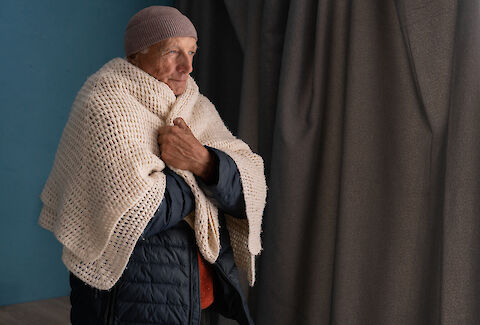
As winter unfolds its chilly blanket across North Carolina, we need to brace ourselves—and particularly our senior loved ones—for its potential health implications. The cold weather can escalate into unpleasant and even dangerous health situations for seniors, such as frostbite and hypothermia.
Here's our quick guide to help seniors stay healthy during the winter season:
Common Cold-Weather Ailments
When temperatures drop, seniors become susceptible to cold-weather hazards like frostbite and hypothermia. Frostbite is a condition that freezes and damages skin and tissues, often affecting exposed extremities such as fingers, toes, the nose, ears, cheeks, and the chin due to prolonged exposure to cold temperatures. Hypothermia occurs when the body's temperature drops below 95°F, affecting the heart, nervous system, and other organs.
It's important to recognize the warning signs of these conditions early. Frostbite symptoms might include numbness, skin discoloration, or a stinging sensation. For hypothermia, watch out for shivering, slow or shallow breathing, confusion, drowsiness, and in severe cases, loss of consciousness.
Dressing for Cold Weather
Dressing appropriately when venturing outside during the winter months can significantly decrease the risk of experiencing cold-weather health problems. Start with layers. Wearing several thin garments can trap body heat more effectively than one thick layer. Choose moisture-wicking fabric for the layer closest to your skin, insulating material for the middle layer, and water-resistant material for the outermost layer. Pay special attention to extremities like your hands, feet, and head as they lose heat rapidly. Don't forget the gloves, thick socks, and beanie hats.
Ensure that seniors' clothing is easy to put on and take off. Clothes with larger zippers and buttons or Velcro can be easier to manage for those with arthritis or limited mobility.
Keeping Homes Safe and Warm
Maintaining a warm home during winter can help prevent health issues caused by low temperatures. Home heating, however, requires caution to avoid fire and carbon monoxide hazards.
- Ensure that space heaters have an automatic shut-off and plug them directly into wall outlets rather than extension cords.
- Keep heaters a safe distance from anything flammable, and never leave them unattended. Check your home's insulation and weather stripping to prevent cold drafts and heat loss.
- Install carbon monoxide detectors on each level of your home, including the basement.
Know When Medical Care Is Necessary
Sometimes, despite all precautions, seniors may still experience frostbite or hypothermia. It's vital to recognize when they need medical care. Seek medical assistance if symptoms such as numbness, color changes in the skin, severe shivering, confusion, or slowed breathing occur. Regularly visit your healthcare provider during the winter months as they can check for signs of any health issues and provide early treatment.
Stay Safe With Senior Helpers
Winter safety for seniors goes beyond staying warm. It's about understanding the risks, recognizing symptoms, and making wise choices that prioritize health and safety.
At Senior Helpers Lake Norman, we're committed to ensuring the safety and well-being of our seniors across Mooresville, Huntersville, Statesville, Denver, and Davidson. If you or your loved one would benefit from professional in-home care through the winter season, contact us at Senior Helpers Lake Norman.